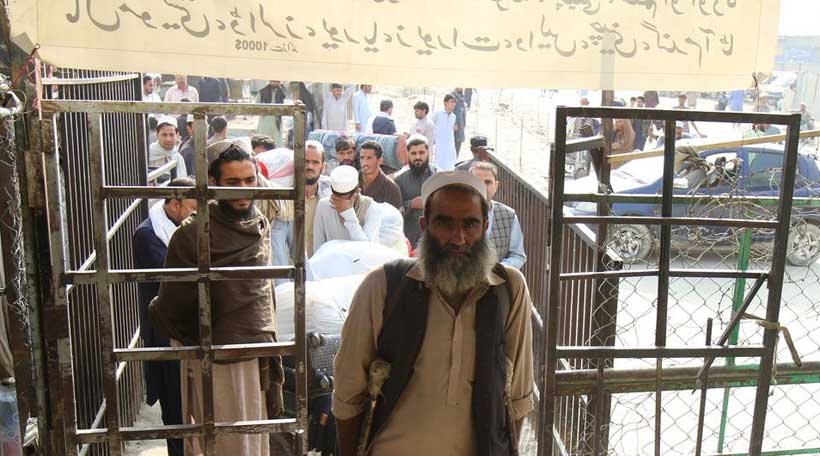The protection of refugees in the contemporary world remains pressing global concern, with millions of people displaced due to conflict, persecution, natural disasters, and environmental crises. Over the several decades, Pakistan has hosted a substantial population of Afghan refugees, but there are now human rights concerns regarding Pakistan’s expulsion of these refugees. These mass deportations present serious human rights concerns and pose challenges for Afghan refugees.
The widespread return of Afghan refugees by Pakistan since November 2023 poses serious human rights concerns and raises questions about the implementation of international human rights frameworks. Pakistan’s new anti-immigrant policy has triggered a mass expulsion of thousands of undocumented Afghan refugees, who are being forced to return to an impoverished and a war-torn Afghanistan. Authorities in Pakistan deported all undocumented Afghans and holders of ACC Cards under the “Illegal Foreigners Repatriation Plan,” and they are now asking that holders of PoR Cards leave by September 1.
Over 4 million Afghans crossed the border throughout the forty years of armed conflict in their country to Pakistan. There is now a global discussion on the ethical and humanitarian implications of Pakistan’s decision to return these refugees to their home country. A Statutory Regulation Order (SRO) was issued by the Government of Pakistan on July 31, 2025, ordering the repatriation of PoR holders whose cards had expired in June 2025, ruling them illegal. According to UNHCR-IOM flow monitoring data on Afghan nationals, as of Aug 8 a total of 1.16 million have returned to Afghanistan since the deportation drive began in 2023.
Human rights organizations and UNHCR have expressed worry about the safety and well-being of these Afghans and condemned Pakistan’s decision of deportation. Pakistan’s strict execution of repatriation will put many lives in danger, particularly given the unprecedented level of political instability their home country is experiencing. In their statement about repatriating PoR card holders UNHCR maintained that “Pakistan’s hospitality to refugees for over 40 years is appreciated, but the forced return of those with PoR cards, who have been recognized as refugees for decades, would violate the principle of non-refoulement and contradict Pakistan’s long-standing humanitarian approach.”
The impacts of these returnees on Afghanistan are too great to ignore. The unexpected surge of people returning to their homeland will put further pressure on Afghanistan’s already precarious position— political instability, scarce resources, and fragile infrastructure. This has made it more difficult for the country to assist its own population adequately and will worsen the humanitarian catastrophe that is now underway. The return of people to a nation still beset by violence and instability has also sparked worries about the security and welfare of the returning refugees, possibly placing them in even more perilous state.
The larger humanitarian crisis in Afghanistan, which has major implications for unemployment, poverty and an uncertain future, exacerbates the issue. Living in dire situations where there are limited resources will be inevitable for families. Moreover, the departure of Afghan refugees is not appropriate given the current state of affairs in Afghanistan. In addition to the lack of sufficient settlements for the deportees, Afghanistan’s security condition is also unclear.
Following their takeover of power in Afghanistan in August 2021, the Taliban shut down female-only schools and prohibited girls from attaining higher studies. In addition, women are prohibited by the Taliban government under morality laws– Propagation of Virtue and Prevention of Vice – from engaging in public life and from traveling alone. Conversely, women and girls who are deported to Afghanistan run the danger of becoming victims of forced and underage marriages. Therefore, women and girls are more likely to be in danger throughout this process of uninvited repatriation.
Looking at the situations of freedom of speech and expression in Afghanistan, it is restricted and severely under threat. Many refugees in Pakistan are those who belong to the expert community; they are journalists, human rights activists, members of the former government, military servicemen, artists and media personnel who fled their country because of imminent risk to their lives. Deportation will endanger their lives, as Taliban detained journalists and severely restricted Media.
Apart from security concerns, the economic outlook in Afghanistan is uncertain. There are no proper employment opportunities for the people, Afghans who lived in Pakistan had property and businesses in Pakistan, so returning them to such a country will have humanitarian challenges. Also, the sanctions imposed on the Taliban by other countries and their disengagement with the outside world prevents trade, investment and cut off of aid in the area. Millions of Afghans now lack access to appropriate healthcare, making them more susceptible to illness. A collapsed economy will lead to extreme poverty among Afghans, affecting medical care and health.
While Pakistan has displayed a significant amount of hospitality by hosting Afghan refugees for decades, the existing deportation has made life difficult for these refugees. It has brought about a climate of persecution and fear in the refugee community. A comprehensive refugee regulation that conforms to international standards —such as rights protection, status recognition, and lasting solution should be developed and implemented by Pakistan. A collaborative approach involving Pakistan, Afghanistan, and the international community is essential to address the crisis. This should prioritize human rights, safety, and long-term solutions, aiming for sustainable peace, stability, and prosperity for both countries and the vulnerable refugees.
